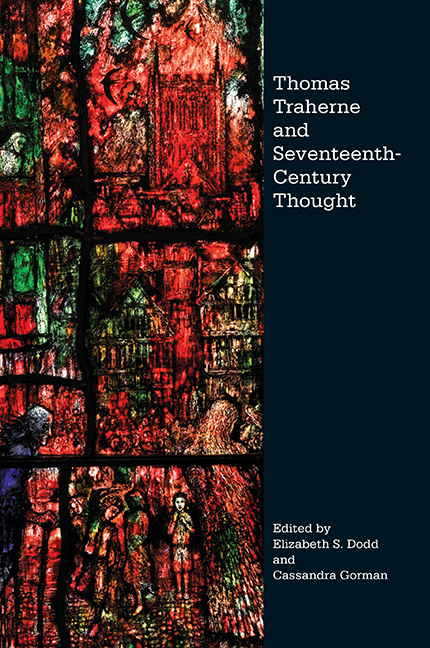Book contents
- Frontmatter
- Contents
- Contributors
- Acknowledgements
- Conventions and Abbreviations
- Foreword
- Introduction: ‘A lover of all Things … An Active ey’ (Select Meditations I.82): Traherne in Context
- PART I PHILOSOPHIES OF MATTER AND SPIRIT
- PART II PRACTICAL AND PUBLIC DEVOTION
- 5 Crossing the Red Sea: The Ceremonial Law, Typology and the Imagination
- 6 Sectarianism in The Ceremonial Law
- 7 Thomas Traherne and the Study of Happiness
- 8 ‘Innocency of Life’: The Innocence of Thomas Traherne in the Context of Seventeenth-Century Devotion
- Afterword by Jacob Blevins
- Chronology of Traherne's Life and Contemporary Intellectual Developments
- Bibliography
- Index
- Index of Biblical References
- Studies in Renaissance Literature
5 - Crossing the Red Sea: The Ceremonial Law, Typology and the Imagination
from PART II - PRACTICAL AND PUBLIC DEVOTION
Published online by Cambridge University Press: 05 July 2016
- Frontmatter
- Contents
- Contributors
- Acknowledgements
- Conventions and Abbreviations
- Foreword
- Introduction: ‘A lover of all Things … An Active ey’ (Select Meditations I.82): Traherne in Context
- PART I PHILOSOPHIES OF MATTER AND SPIRIT
- PART II PRACTICAL AND PUBLIC DEVOTION
- 5 Crossing the Red Sea: The Ceremonial Law, Typology and the Imagination
- 6 Sectarianism in The Ceremonial Law
- 7 Thomas Traherne and the Study of Happiness
- 8 ‘Innocency of Life’: The Innocence of Thomas Traherne in the Context of Seventeenth-Century Devotion
- Afterword by Jacob Blevins
- Chronology of Traherne's Life and Contemporary Intellectual Developments
- Bibliography
- Index
- Index of Biblical References
- Studies in Renaissance Literature
Summary
When my Soul is in Eden with our first Parents, I my self am there […] I can visit Noah in His Ark, and swim upon the waters of the Deluge. (Centuries of Meditations, Ross, V, I.55)
The Ceremonial Law, a didactic poem by Traherne in heroic couplets, discovered in 1997 and only recently published, is a commentary on Genesis and Exodus, applying such episodes as the crossing of the Red Sea and the manna in the wilderness to the lives of ordinary Christians. In this poem, unlike Centuries of Meditations and the poems in the Dobell manuscript, the ‘I’ is clearly a representative figure with no autobiographical elements. Lines such as ‘In Lands remote I see my self made High’ or ‘I there behold a Tabernacle’ (‘Introduction’, p. 197, 20, 30) do not present a private, ecstatic experience but something readily available to any Christian believer. The method of the poem is typological: passages in the Old Testament not only can be seen as prefiguring the teachings of Jesus in the New Testament, but are re-enacted in everyday life. As Barbara Lewalski points out, such presentation of the experience of the Israelites as ‘direct correlatives’, ‘being ensamples to us, and evident types of our estate who live under the Gospel’, was fairly common in seventeenth-century commentaries on Scripture.
In ‘A Reflexion’, where the pronouns Traherne consistently uses are ‘we’ and ‘our’, Traherne comments on his typological method in terms of ‘fit and Perfect Symmetrie’, God's design made apparent in ‘all the Parts of Time’ (p. 218, 10–11). Citing the rather unlikely parallels of twelve apostles and twelve tribes of Israel (as well as twelve springs, twelve oxen, twelve thrones, and twelve loaves of bread in various biblical episodes), Traherne sees repeated ‘Proportion’ in ‘Strange and Wonderfull’ examples for our edification (p. 219, 55), made immediately discernible to anyone who can recognise the pattern:
All which in His Proportions we may find Plainly Exhibited even to the Blind […] tis an Excellence As we may well Discern even by our sence. (‘A Reflexion’, 60–1, 102–3)
‘The Church’, as he uses the term in The Ceremonial Law, is the church militant, all believing Christians, wherever they may be, who, in their own lives, re-enact the experience of the Israelites.
- Type
- Chapter
- Information
- Thomas Traherne and Seventeenth-Century Thought , pp. 107 - 129Publisher: Boydell & BrewerPrint publication year: 2016



